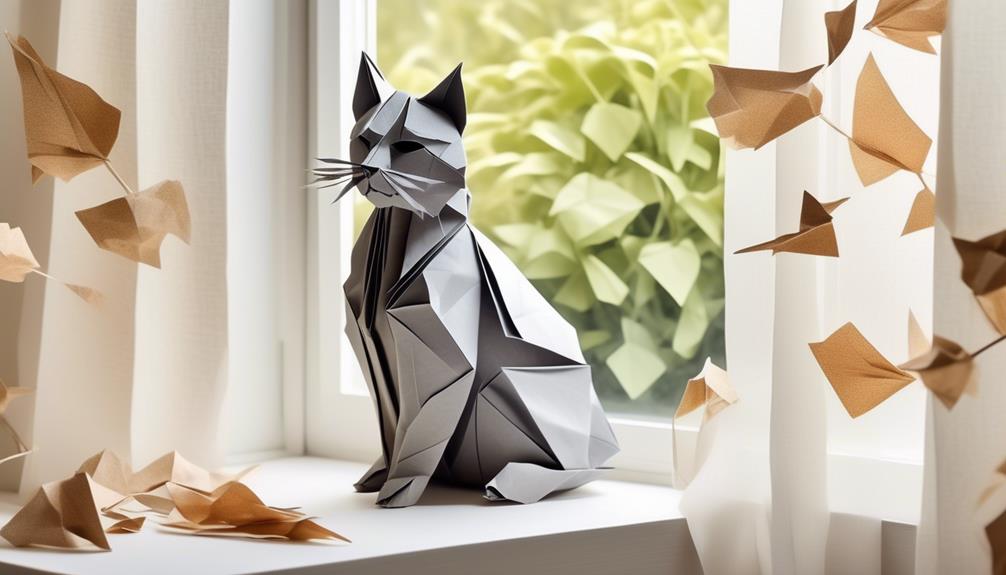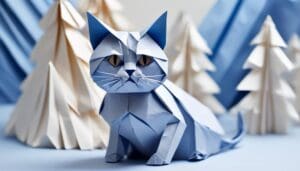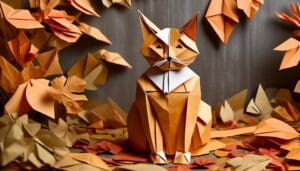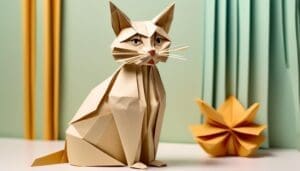You might think that age-related hearing loss in your senior cat is inevitable, but there are actually diet adjustments that can help support their auditory health.
As you cherish the twilight years with your cat, it’s essential to focus on their nutritional needs, which can have a profound impact on their senses. By incorporating antioxidant-rich foods, omega-3 fatty acids, and high-quality proteins into their diet, you’re not just offering them a tasty meal, but also providing the nutrients vital for maintaining their hearing.
Vitamin E supplementation and proper hydration play subtle yet significant roles, too. And while it’s true that no diet can turn back the clock, a carefully chosen feeding plan can help optimize your cat’s health and potentially keep their senses as sharp as possible.
Stay with me, and I’ll guide you through six of the best diet choices that might make those quiet moments a bit more vibrant for your beloved cat.
Key Takeaways
- Antioxidant-rich foods and omega-3 fatty acids can bolster a senior cat’s immune system and improve their auditory health.
- Fish oil from salmon and sardines is a natural source of omega-3 fatty acids for cats, and senior cat food often includes omega-3s.
- High-quality proteins from animal sources are essential for maintaining a senior cat’s muscle and organ health.
- Vitamin E supplementation can help manage age-related conditions in senior cats, but it’s important to consult a veterinarian for the right balance.
Antioxidant-Rich Foods
Incorporating antioxidant-rich foods into your senior cat’s diet can frequently bolster their immune system and support their precious hearing and cognitive health. As you tenderly care for your aging cat, understanding their nutritional requirements becomes paramount.
Foods teeming with antioxidants, such as those high in vitamin E and omega-3 fatty acids, offer a wellspring of essential nutrients that nurture your cat’s well-being.
Antioxidants are vital in mitigating inflammation and oxidative stress, common ailments that can compromise the health of senior cats. These nutrients are particularly beneficial in managing chronic conditions like heart and kidney diseases, which often afflict older felines. By thoughtfully selecting meals fortified with these powerful compounds, you’re not only catering to their taste buds but also contributing to a robust immune system that shields them from various health issues.
As chronic kidney disease and lower urinary tract disease are prevalent in senior cats, a diet enriched with antioxidants can play a significant role in preventive health care.
Your dedication to their diet will help maintain their auditory and cognitive functions, allowing you to cherish every moment with your beloved pet. Remember, serving them well means lovingly meeting their dietary needs with the utmost compassion.
Omega-3 Fatty Acids
You’re already doing a fantastic job caring for your senior cat, and adding Omega-3 fatty acids to their diet could be a game-changer for their health.
These nutrients aren’t only essential for maintaining a lustrous coat and supple joints but also play a key role in supporting your cat’s auditory health.
Let’s explore how these fatty acids can benefit your cat’s hearing, where you can find them, and how to safely incorporate them into your cat’s meals.
Benefits to Auditory Health
Omega-3 fatty acids are a cornerstone of nutritional health that can help preserve the hearing of older cats. These essential nutrients may reduce inflammation and improve blood flow, vital for auditory health.
| Benefits of Omega-3 Fatty Acids | Impact on Senior Cats |
|---|---|
| Reduces Inflammation | Protects Ear Health |
| Improves Blood Flow | Preserves Hearing |
| Supports Ear Structures | Aids Against Age-related Issues |
Including omega-3 fatty in your cat’s diet, whether through wet cat food that meets AAFCO standards or other sources, contributes to the overall well-being of your aging cat. These fatty acids are integral in keeping the muscle and protein structures within the ear healthy, combating potential health issues linked to aging.
Dietary Sources for Cats
Understanding the importance of omega-3 fatty acids for your senior cat’s ear health leads us to explore which foods naturally provide these essential nutrients.
Feeding your cat dietary sources rich in omega-3s, like fish oil from salmon and sardines, supports not just their hearing but also their brain function and cognitive health.
As your cat is considered mature, their nutrient requirements shift. Thankfully, the best food for senior felines often includes senior cat food specially formulated to meet these needs.
Look for nutritional offerings that are complete and balanced, adhering to the standards set by the AAFCO, with omega-3 fatty acids added.
This ensures that you’re not just caring for their hearing, but also alleviating joint pain and aiding in mobility, enriching their golden years with vitality.
Serving Suggestions & Safety
To safeguard your senior cat’s health and enhance their hearing, it’s crucial to serve omega-3 fatty acids in the right amounts and from safe sources. When you’re feeding your beloved cat, keep their weight and body condition in mind. If your cat is overweight, even the healthiest food must be given thoughtfully.
Here are some gentle tips:
- Gradually introduce omega-3 supplements into their diet, monitoring for any sensitivities.
- Choose high-quality fish oil or cat-specific supplements rather than human products.
- Consult your veterinarian for precise dosing tailored to your cat’s specific needs.
High-Quality Proteins
When caring for your senior cat, opting for cat food rich in high-quality proteins can significantly support their muscle and organ health, keeping them vibrant and active in their golden years. As your beloved cat faces age-related physical changes, it’s essential to focus on proper nutrition that maintains their muscle mass and overall vitality.
Senior cats require a nutrient profile different from younger felines, one that supports their slowing metabolism while preventing the loss of muscle that often comes with advancing age. High-quality proteins from animal sources aren’t just a preference; they’re a necessity. They help older cats sustain their strength and can be crucial in managing weight and combatting chronic conditions.
When selecting cat food, aim for options that boast a high protein content with minimal carbohydrates. This mirrors a cat’s natural eating habits and ensures they’re getting what they need without unnecessary fillers. Remember, the right balance of nutrients, including high-quality proteins, is key to your senior cat’s health and can even contribute to better hearing and a more engaged life.
Vitamin E Supplementation
As your senior cat ages, incorporating Vitamin E supplements into their diet can bolster their immune system, helping them stay resilient against common health challenges. You’re not just a pet owner; you’re a caretaker of a life that has graced you with countless purrs and tender moments. Ensuring their golden years are comfortable is one of the best gifts you can give.
To enrich their health, consider these points:
- Consult a Vet: Always seek advice from a veterinarian before adding supplements to your cat’s diet to find the right balance.
- Quality Matters: Choose cat-specific supplements that meet the Association of American Feed Control Officials (AAFCO) dietary guidelines.
- Monitor Health: Keep an eye on your cat’s overall health and adjust their diet as recommended by a nutritionist or vet.
Vitamin E supplementation, when administered appropriately, can be a key factor in managing age-related conditions like joint issues and chronic inflammation. It’s crucial, however, to avoid over-supplementation, which can lead to adverse effects.
Hydration and Electrolytes
You know how vital water is for your senior cat’s health, just as it’s for yours. Ensuring they maintain a proper balance of electrolytes can ward off the subtle signs of dehydration that might otherwise go unnoticed.
Let’s explore how to keep your cherished cat well-hydrated and alert to the world around them.
Importance of Water
To safeguard your senior cat’s health, ensuring they’re well-hydrated is a cornerstone of their diet, as their ability to detect thirst diminishes with age. As cats reach their senior years, it’s crucial to pay close attention to their water intake. Proper hydration supports kidney function and urinary tract health, which are common concerns for aging felines.
Here’s how you can help your senior cat stay hydrated:
- Offer canned food for seniors; its higher moisture content can boost hydration.
- Place multiple water bowls around your home, where your cat prefers to spend time.
- Consider a pet fountain to encourage them to drink more water.
Electrolyte Balance Essentials
Maintaining a balanced electrolyte level in your senior cat is often overlooked but is vital for their hydration and overall well-being. These electrolyte balance essentials, including sodium, potassium, magnesium, and phosphorus, play a significant role in kidney health and fluid regulation. As a caring guardian, you’ll want to ensure that their dietary needs are met with the guidance of a trusted nutritionist or veterinarian.
Canned food can be a helpful way to increase hydration, as it contributes to a more moisture-rich diet. Remember, your senior cat’s access to fresh water should be constant to prevent dehydration. By attentively monitoring their water intake and addressing electrolyte imbalances, you’re nurturing not just their physical health but also the loving bond you share.
Signs of Dehydration
As the years pass, senior cats may need higher attention to their hydration, as their sense of thirst diminishes.
Here are some signs to look out for:
- Sunken eyes or a dry mouth, which indicate a need for immediate hydration.
- Loss of skin elasticity; if you gently pinch their skin and it doesn’t spring back quickly, your cat gets a check in the dehydration box.
- Notice weight loss or a decline in muscle condition, as losing weight can be a subtle hint of dehydration.
Always ensure your Senior Cat gets the check-ups they need and offer food for older cats that can help maintain hydration. If you’re concerned, a vet visit is the best course of action.
Specialized Senior Cat Diets
When caring for your aging cat, considering specialized senior cat diets can play a pivotal role in managing health conditions and enhancing overall well-being. As your Senior Cat enters their senior years, their nutritional needs evolve. Feeding a Senior cat isn’t just about the frequency of meals but also about the quality and specificity of the diet to their changing life stages.
Senior and geriatric cats require fewer calories as their energy needs decrease. It’s essential to feed them a diet that supports a lower energy lifestyle while preventing weight gain.
Here’s a simple guide to help you understand the basics of specialized senior cat diets:
| Benefits of Specialized Diets | Examples |
|---|---|
| Weight Management | Lower-calorie formulas |
| Hydration Support | Canned food with high moisture content |
| Condition-Specific Nutrition | Formulas for kidney or heart health |
Always consult with a veterinarian to tailor the diet to your senior cat’s specific health requirements. Remember, your gentle approach in transitioning them to a diet that meets their energy needs is as important as the diet itself. Your heartfelt care will ensure their golden years are spent in comfort and good health.
Frequently Asked Questions
What Is the Best Food to Feed an Elderly Cat?
You’ll want to feed your elderly cat a high-protein, wet food diet that’s gentle on their stomach and meets their specific health needs. Always consult your vet for personalized advice.
What Is the Number One Senior Cat Food?
Find the best senior cat food for your pet’s later years by consulting your veterinarian for a personalized recommendation.
How Do You Enrich a Senior Cat’s Life?
You’ll enrich your senior cat’s life by providing engaging toys, a cozy environment, and regular vet checkups. Gentle play and affection also keep their spirits high and contribute to their overall well-being.
What Nutrition Does a Senior Cat Need?
Your senior cat needs nourishing nutrients—ample protein to preserve muscle, controlled calories for digestion, and sufficient hydration. Tenderly tailor their diet with a vet’s advice for their unique health necessities.




